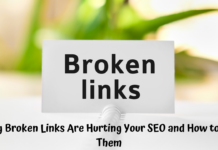
Keep a few points in mind when considering external links for your website. For starters, don’t link to sites that directly compete with yours.
Also, avoid sites that seem like they are trying to attack you.
Finally, don’t use more links than your content calls for. Too many links can distract your readers and cause them to leave your site instead of engaging with your content.
Avoid linking to competitors’ sites
The goal of your website is to attract as many visitors as possible, but linking to competitor sites may drive away your audience.
In addition to lowering your website’s authority, external links tell search engines that your competitor’s content is better than yours, which could hurt your search engine rankings.
Also, external links drive away traffic to your competitors’ sites, which is a waste of time and money.
When considering external links, try to select relevant and unique links. It is also a good idea to use non-anchored text. This way, your visitors will not leave your site unless they want to.
Similarly, use a diverse link profile with social networking and forum links. Finally, check that your external links are indexed. It is always important that you follow best practices for external links to avoid any complications.
Avoid linking to obnoxious or overdone sites
It would be best if you kept the link text relevant to the page’s content when considering external links. Anchor text shoehorned into the sentence may appear spammy to readers, so use common sense to link to make it appear natural. You should also avoid using the same anchor text over and over.
In some cases, linking to external sites is a great way to develop relationships and extend your reach. For example, if you link to a siding company’s website, the siding company’s SEO manager may notice a new influx of traffic on their site.
This is a mutually beneficial relationship. Your link generously shows that you value the readers’ time. It also shows that you care about your readers.
Avoid linking to sites that appear to be attacks

When considering external links, it is important not to link to sites that seem attacked. This can happen for several reasons, including site changes.
For example, a page could have been redirected, or the content might have been updated.
However, if you notice that many of your links have been removed, you may be the target of a link removal attack.
If this is the case, it is important to contact the site and ask them why they removed your link. Then, you can ask them to reconsider adding your link if they are willing.
Avoid linking to irrelevant sites
Linking to other websites is a great way to add additional resources to your content and improve the user experience. When choosing external links, choose sites relevant to your site’s content and audience.
This will not only improve the user experience but will also benefit your SEO.
Linking to unrelated sites can lower your page authority and search ranking. In addition, search engines can recognize patterns between linked sites and may consider the linking manipulative.
For example, link overload between two domains could lead to heavy penalties from search engines. For this reason, make sure your links provide value to your readers.
It is best to choose authoritative sites for external links. While Google is an authority, you might also want to link to an established expert in your niche.
These experts are not necessarily the biggest or the most popular, but they are still worth considering as peers. Linking to established experts is a good strategy as it can pay off in the long run.
Avoid including too many external links
Adding too many external links on your website can degrade the overall value of the page and decrease the link equity on internal pages.
Ideally, you should use 3 to 5 external links on each page. However, higher numbers can be acceptable if you have a lot of content on your site.
When using external links, choose trusted sources, and assess the link’s domain authority. This will give Google an idea of how reliable the content is.
Also, try to link to relevant content, as this will show the search engine that you did your research. You can make sure your website receives the best ranking for relevant keywords by utilizing trusted external links.
While external links are useful to boost your website’s performance, you should use them wisely and avoid bad practices. For instance, using too many external links as spam can lead to a Google Penalty, which can ruin your ranking.















